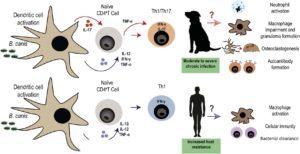
Graphical Abstract. Source: Pujol et al., 2019. Comparative Immunology, Microbiology and Infectious Diseases.
Canine brucellosis is a worldwide disseminated disease caused by Brucella canis, an intracellular bacterium that causes reproductive disorders and multisystemic inflammatory lesions. Like other intracellular microorganisms, Brucella spp. uses different mechanisms to evade the immune system. Of particular scientific interest is the interaction that it establishes with antigen-presenting cells that allows it to interfere with the development of an effective cellular immune response, causing chronic infections. Studies have demonstrated differential cytokine and activation profiles of monocyte-derived dendritic cells (MoDCs) isolated from humans and canines.
Study by Pujol et al., aimed to contribute to a better understanding of the immune-pathogenesis of B. canis, in this work they investigate the CD4+ T cell responses after encountering B. canis-primed MoDCs. They conducted in vitro B. canis stimulations of CD14+ monocytes, MoDCs and CD4 T cells isolated from canine and human peripheral blood mononuclear cells (PBMCs, see methods for more details).
Pujol et al., demonstrated that human cultures developed a Th1 response against B. canis, with increased expression of IL-1β, IFN-γ and TNF-α; while a Th1/Th17 profile was triggered in canine lymphocytes, with increased expression of IL-17A, IFN-γ and TNF-α. Together with the differences in the pattern of cytokines produced by canine and human CD4+ T cells, quantitative differences were also detected. In particular, IFN-γ production was higher in human CD4+ T cells compared with canine CD4+ T cells and IL-17A production was higher in canine CD4+ T cells compared with human CD4+ T cells.
In conclusion, this study demonstrates that there is a difference in the in vitro cellular immune responses elicitated to B. canis in canines and humans. This partially could determine the greater susceptibility of domestic canines to B. canis infection since the Th1/Th17 response found could interfere with the development of an effective Th1 response. Although further investigations are required, their results provide relevant information that could contribute to develop therapeutic or preventive alternatives for the efficient control of brucellosis.
Article: Pujol et al., 2019. Brucella canis induces canine CD4+ T cells multi-cytokine Th1/Th17 production via dendritic cell activation. Comparative Immunology, Microbiology and Infectious Diseases.
Article by Mg. Vet. Giselle G. Ingratta










